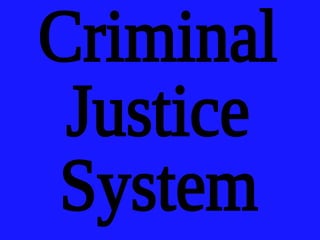Criminal Justice System - Laura Morgan
•Télécharger en tant que PPT, PDF•
1 j'aime•662 vues
Signaler
Partager
Signaler
Partager

Recommandé
Recommandé
This set of presentation slides provides an overview of the criminal court processes in Canada from the point of view of the victims of violent crime.Understanding the criminal court process as a victim - Victim Justice Network

Understanding the criminal court process as a victim - Victim Justice NetworkCommunity Legal Education Ontario (CLEO)
Contenu connexe
Tendances
This set of presentation slides provides an overview of the criminal court processes in Canada from the point of view of the victims of violent crime.Understanding the criminal court process as a victim - Victim Justice Network

Understanding the criminal court process as a victim - Victim Justice NetworkCommunity Legal Education Ontario (CLEO)
Tendances (18)
Understanding the criminal court process as a victim 

Understanding the criminal court process as a victim
Understanding the criminal court process as a victim - Victim Justice Network

Understanding the criminal court process as a victim - Victim Justice Network
Understanding the Criminal Court Process as a Victim 

Understanding the Criminal Court Process as a Victim
Similaire à Criminal Justice System - Laura Morgan
Similaire à Criminal Justice System - Laura Morgan (20)
INVESTIGATIONS AND THE TRIAL PROCEDURE IN UGANDA 2

INVESTIGATIONS AND THE TRIAL PROCEDURE IN UGANDA 2
Mitigation and Sentencing in Criminal Litigation.pptx

Mitigation and Sentencing in Criminal Litigation.pptx
The Criminal Justice Process Varies From State To State Week 6

The Criminal Justice Process Varies From State To State Week 6
Discovering the Ins and Outs of Criminal Trials in Canada 

Discovering the Ins and Outs of Criminal Trials in Canada
ch 6- civics understanding our criminal justice system class 8

ch 6- civics understanding our criminal justice system class 8
Chapter1. Plea bargaining.Plea agreement is any agreement in a c.docx

Chapter1. Plea bargaining.Plea agreement is any agreement in a c.docx
Plus de BSCSCITIZENSHIP
Plus de BSCSCITIZENSHIP (20)
Criminal Justice System - Laura Morgan
- 2. Once a crime has been broken, the victim will tell the police what has happened; and this is called making a Statement. Stage 1 – Law is Broke
- 3. Now the police will find out about the person who has been accused, and if they believe the person is guilty, the police will take the accused to the police station; this is called making an Arrest .
- 4. Once at the police station the arrested person can ask for help from a Solicitor. A solicitor is someone who knows all about the law.
- 5. The police officers who are finding out about the crime will Question the arrested person. Stage 2 - Charges
- 7. 1) The charged person will then appear in the magistrates’ court. 2) The Charge sheet will be read out, and this explains what the person has been accused of. 3) The solicitor may ask for bail, and the magistrates decide whether to remand into custody or bail. This is how the magistrates court is laid out. More info on the next slide… Stage 3 Remand
- 8. Remanded in custody Someone who has been charged must stay locked up until they appear in court again. Remanded on bail This means they are charged with a crime but can go free until they appear in court again. Bail conditions mean a promise to behave in a certain way, maybe to not go near the crime victim.
- 9. 1) The accused person and their solicitor write down exactly what they say has happened, statement. 2) Police help other people who have seen what happened, witnesses, to write down what they saw. 3) The Crown Prosecution Service (CPS) get all of the information and see if there is enough evidence to prove the person did the crime. Stage 4 Get ready for court
- 10. Most defendants now appear in court. There is no jury, just the magistrates, the judges, make the decisions. 1) The defendant has to say if they are 'guilty' or 'not guilty'. If the defendant says that they are guilty then the magistrates make their decision over what the punishment will be., called sentencing . If the defendant says they are not guilty then the Crown Prosecution Service tells the court why they think they are guilty. Stage 5 Magistrates Court
- 11. The more serious crimes, like murder, are dealt with in Crown Courts. A judge and jury make the decisions whether guilty or not guilty. A jury is a group of 12 randomly selected ordinary people across the country. When the jury have heard the reasons for the defendant being guilty and the reasons for them being innocent they make their decision. There needs to be at least 10 of the jury to agree on their ‘verdict’. Stage 6 The Crown Court
- 12. Stage 7 Sentence